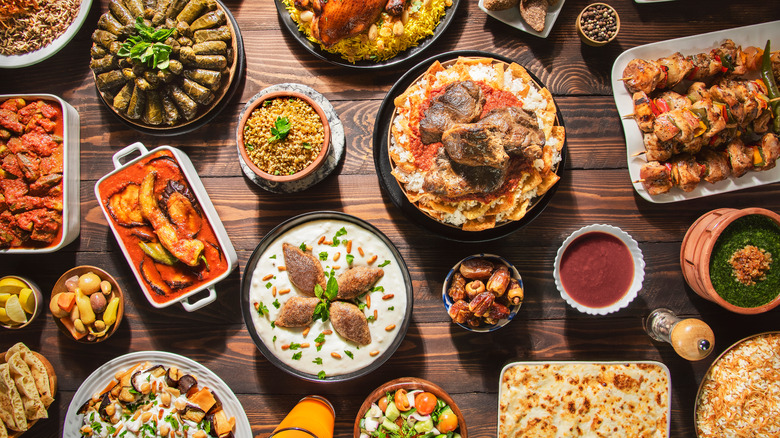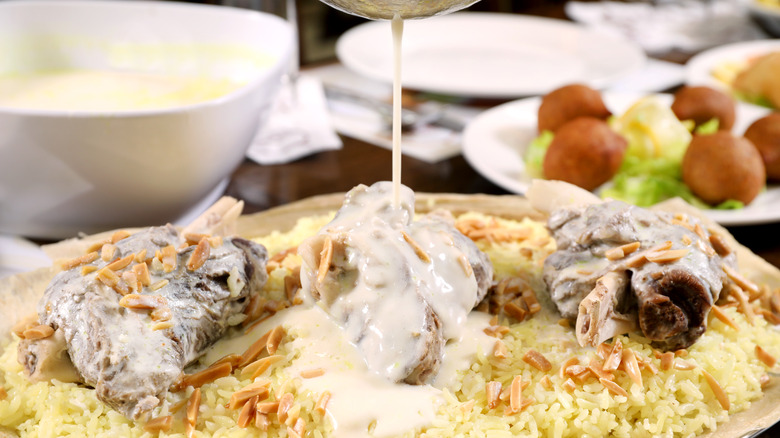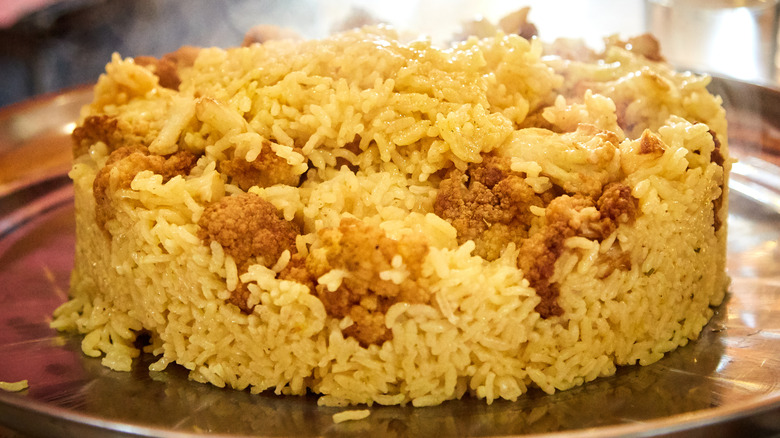This Is What Americans Get Wrong About Middle Eastern Food - Exclusive
To most Americans, "Middle Eastern food" means hummus, baba ghanoush, and falafel — maybe a shish kabob or two. But according to chef Erez Komarovsky, award-winning chef and founder of Israeli bakery chain Lehem Erez, these popular takeout entrees barely scratch the surface of the kinds of food you'd be eating if you actually lived in this corner of the world. This is especially true when it comes to Israel, where Komarovsky lives, cooks, and bakes.
"I think for the Americans, Israeli cuisine means only ... lemon juice, garlic, tomato, and chili," Komarovksy said. "I think this is only [a] small part of our repertoire." So what does Middle Eastern — and specifically Israeli — food entail? In an exclusive interview with Mashed, Komarovsky debunked American misunderstandings about food from his home turf and described some tempting dishes that will make you drop what you're doing and book your next flight to Tel Aviv ... or, at the very least, reserve a table at an Israeli restaurant near you.
These are popular foods you'll find in the Middle East
According to Erez Komarovsky, the true trademark of Middle Eastern cuisine is slow cooking, done by hand, Komarovsky explained. "This is something that we do a lot, slow cooking over fire, slow cooking in a wood-fired oven," he said. Despite dramatic differences in the cultures and religions in the Middle East, a preference for the open fire vs. the microwave is one thing Middle Easterners have in common. "Both in the North African cuisines and in Turkish-originated cuisine — large[ly] Syrian cuisine, the Shami cuisine, and from all over, actually — Iraqi and stuff, this is more handmade — kind of a stuffed thing," Komarovsky said.
It's common in Israel, for example, to enjoy for dinner a dish Komarovsky described as "slowly cooked lamb with dried fruits." Other popular dishes include mansaf, which is lamb, rice, and dried yogurt (per Migrationology), and maqluba, described by The New York Times as an upside-down layered dish of meat, rice, and fried vegetables. "This is all from different [regions] and wonderful, wonderful dishes that are very popular in Israel — mainly popular in the home cooking with the grandmothers," he explained. "But it [goes] into the fine cuisine in restaurants."
Israeli cuisine was created by "grandmothers" from all over the world, according to chef Komarovsky
So why is the food in this region so unique? According to Komarovsky, Middle Eastern cuisine is a medley of different cooking techniques brought together by "grandmothers" who hailed from many regions all over the world and learned different recipes from each other. "Let's be honest. Israeli cuisine is ... also from dishes that my grandmother brought with her from Poland. It consists also from someone's, say, Persian grandmother's recipes," he explained. Apparently, amazing flavors were discovered when these grandmothers moved into neighboring homes and began to chat and nosh on each others' specialty dishes. "In Israel, where an Iraqi housewife or chef meets a Turkish neighbor, and they start giving one another to taste — then suddenly, the Iraqi chef is influenced by a small technique or a small flavor, or introduces a different spice that his mother has used, and he is allowed to do it because all of us are doing it," he said.
That's why you might notice that foods that are traditionally thought of as Jewish and foods that are thought of as having Islamic roots actually have quite a bit in common, Komarovsky pointed out. Take kreplach, a Jewish meat dumpling, and shish barak, a Lebanese lamb dumpling usually served with yogurt sauce (per Food52). "The difference between kreplach and shish barak is the dough. It is very similar, very similar," he explained. "The usage of it is different, but nowadays, we can do shish barak with the same stuffing as kreplach, and put it into a chicken stock and make something completely new."
"Americans see Israeli cuisine as Jewish cuisine. Israelis don't look at the Israeli cuisine as only Jewish," Komarovsky concluded. "It's also Muslim. It's also Christian. It also draws [from] all the populations that live in Israel."
If you're interested in learning Israeli cooking, you'll definitely want to check out chef Erez Komarovsky's class on the roots of Middle Eastern cuisine over at YesChef.


